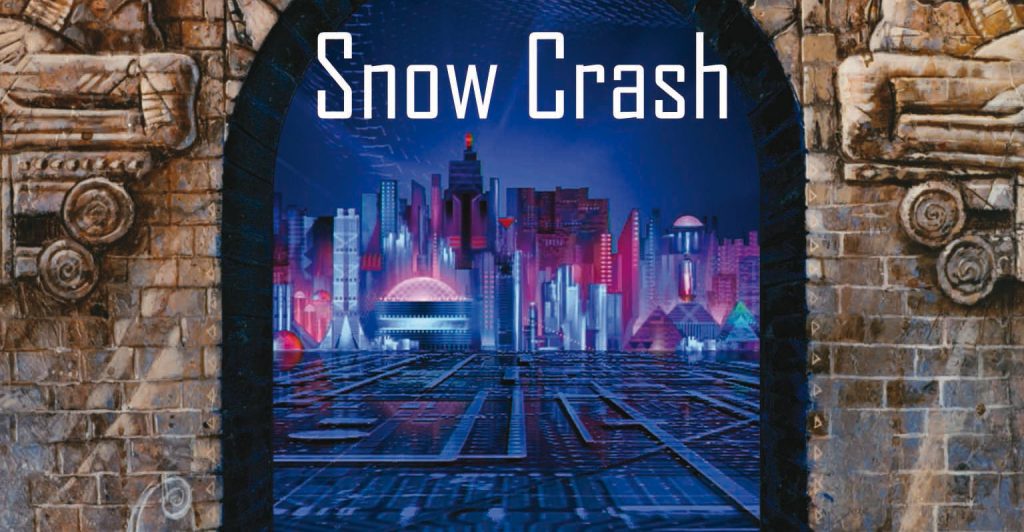How Neal Stephenson’s Sci-Fi Novel Snow Crash Invented the “Metaverse,” Which Facebook Now Plans to Build (1992)

Whatever the benefits and pleasures of our current internet-enriched world, one must admit that it’s not quite as exciting as the setting of Snow Crash. Originally published in 1992, that novel not only made the name of its author Neal Stephenson, it elevated him to the status of a technological Nostradamus. It did so, at least, among readers interested in the internet and its potential, which was much more of a niche subject 29 years ago. Of the many inventions with which Stephenson furnished Snow Crash‘s then-futuristic 21st-century cyberpunk reality, few have captured as many techie imaginations as the “metaverse,” an enormous virtual world inhabited by the avatars of its users.
“Lots of other science fiction media includes metaverse-like systems,” writes The Verge’s Adi Robertson, but “Stephenson’s book remains one of the most common reference points for metaverse enthusiasts.” This holds especially true in Silicon Valley, where, as Vanity Fair‘s Joanna Robinson puts it, “a host of engineers, entrepreneurs, futurists, and assorted computer geeks (including Amazon C.E.O. Jeff Bezos) still revere Snow Crash as a remarkably prescient vision of today’s tech landscape.” It’s rumored that Facebook CEO Mark Zuckerberg will soon announce his company’s intent to change its name to one that better suits its own long-term plan: to transition, as Zuckerberg himself put it, “from people seeing us as primarily being a social media company to being a metaverse company.”
Bold though this may sound, astute readers haven’t forgotten that Snow Crash is a dystopian novel. The metaverse it presents “is an outgrowth of Stephenson’s satirical corporation-dominated future America,” writes Robinson, “but it’s undeniably depicted as having a cool side.” After all, the novel’s protagonist is “a master hacker who gets in katana fights at a virtual nightclub,” though his virtual existence compensates for a grimmer real-world lifestyle. “In the book, Hiro lives in a shabby shipping container,” Stephenson says, “but when he goes to the Metaverse, he’s a big deal and has access to super high-end real estate.” This may sound faintly reminiscent of certain online worlds already in existence: Second Life, for example, whose heyday came in the early 2010s.
Though presumably more ambitious, Zuckerberg’s vision of the metaverse remains, for the moment, broadly defined: it will consist, he’s said, of “a set of virtual spaces where you can create and explore with other people who aren’t in the same physical space as you.” But as The Verge’s Alex Heath notes in an article on Facebook’s impending name change, the company “already has more than 10,000 employees building consumer hardware like AR glasses” — glasses, that is, for augmented reality, the overlaying digital elements onto the real world — “that Zuckerberg believes will eventually be as ubiquitous as smartphones.” It’s not impossible that he could be leading the way toward the thrilling, dangerous, and often hilarious virtual world Snow Crash held out to us — and in whose absence we’ve had to make do with Facebook.
Related Content:
The Story of Habitat, the Very First Large-Scale Online Role-Playing Game (1986)
William Gibson, Father of Cyberpunk, Reads New Novel in Second Life
Sci-Fi Author J.G. Ballard Predicts the Rise of Social Media (1977)
Based in Seoul, Colin Marshall writes and broadcasts on cities, language, and culture. His projects include the Substack newsletter Books on Cities, the book The Stateless City: a Walk through 21st-Century Los Angeles and the video series The City in Cinema. Follow him on Twitter at @colinmarshall or on Facebook.
How Neal Stephenson’s Sci-Fi Novel Snow Crash Invented the “Metaverse,” Which Facebook Now Plans to Build (1992) is a post from: Open Culture. Follow us on Facebook and Twitter, or get our Daily Email. And don't miss our big collections of Free Online Courses, Free Online Movies, Free eBooks, Free Audio Books, Free Foreign Language Lessons, and MOOCs.
from Open Culture https://ift.tt/3aVUVUi
via Ilumina
Comments
Post a Comment